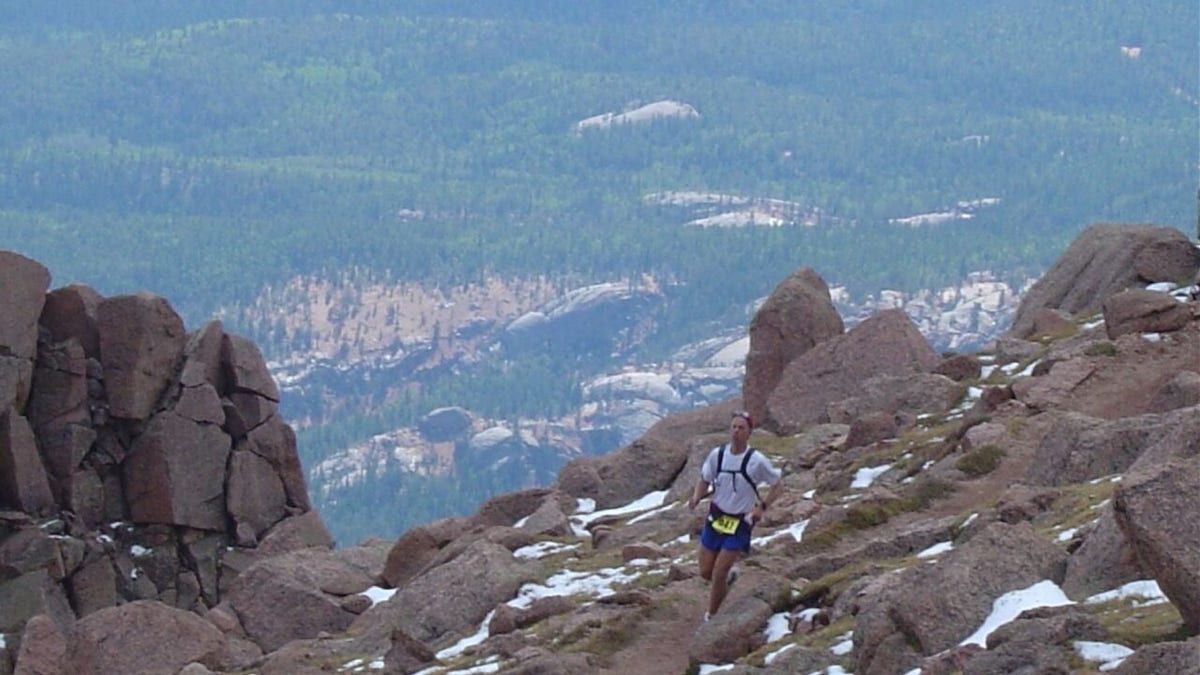The small, picturesque mountain town of Manitou Springs, Colo., was buzzing this past Sunday, its main street filled with hundreds of runners raring to make their 26.2-mile pilgrimage up and down Pikes Peak – the famed 14,115-foot summit on the Front Range of the majestic Rocky Mountains.
I was excited to be part of the masses – and grateful to run my 21st Pikes Peak Marathon in 22 years. A chronic injury sidelined me last year, but it felt good to be back.
The fate of this year’s August running was an open question given the COVID-19 pandemic. Thousands of running races have been canceled throughout the country since March, including such historic events as the Boston Marathon and the upcoming New York City Marathon in November.
PAUL BATURA: CHILDREN AND 2020 ELECTION – GOOD CITIZENSHIP STARTS WITH THIS
By definition, every “marathon” is the same distance, but the Pikes Peak race is its own unique breed. It was first held 65 years ago as a contest between smokers and non-smokers.
Not surprisingly, the non-smokers won.
CLICK HERE TO GET THE OPINION NEWSLETTER
Billed as “America’s Ultimate Challenge,” the race has morphed from just the marathon, which is always held on Sunday, to two separate events. The “Ascent” – a half-marathon held on Saturday – follows the same 13.1-mile trail up, but then shuttles all the runners down the Pikes Peak Highway in comfortable, air-conditioned vans.
When it became clear the coronavirus wasn’t going to fade away this summer, the longtime president of the race, Ron Ilgen, had to make the difficult decision whether to cancel or proceed as planned. After a lot wrestling and consultation, he decided to cancel the Ascent but move ahead with the marathon.
More from Opinion
“We feel that it is impossible to hold a version of the Ascent that would both be safe for runners and volunteers, and meet our standards for a quality event,” he wrote.
How do you keep mobs of strangers physically distanced inside vehicles? You can’t.
But on marathon Sunday, outside in the crisp, open, high-altitude mountain air, runners get up and down on their own power, often spaced far apart from one another.
Organizers took extra care to keep everyone safe. Masks were required prior to the start, aid stations were scaled back and included jugs of hand-sanitizer. Volunteers wore gloves and face shields. The usual pre- and post-race festivities were scrubbed.
One of the reasons I love running so much (I’ve completed 78 marathons) is because the challenge is a metaphor for life itself, especially in this COVID-19 era.
Today’s race must be run, one step at a time. Amid the grit, look for the good. Despite the heaviness, happiness still surrounds us.
Life these days, like a marathon, can be hard – but it can also be beautiful and rewarding.
Tough and terrific are not mutually exclusive terms. Some miles are easier than others, but every journey has its ups and downs. If you can’t run, you walk and keep moving. You may even want to quit at times – but you dare not.
If you fall, you get back up. For us weekend warriors, it’s not about winning. It’s about finishing.
Given the challenges of running long distance, it was fitting that Ron and his team worked so hard to pull this race off in the face of overwhelming odds and countless setbacks.
Whether you run or not, though, there’s a lesson for everyone in that persistent spirit.

The author running the Pikes Peak Marathon (Photo courtesy of the author)
When life throws you a challenge, don’t be so quick to throw in the towel. “Where there’s a will, there’s a way” may be an overused cliché, but it’s true.
Like it or not, COVID-19 is lingering – but we still have to live our lives. Shutting down the economy again isn’t really an option – it’s suicide, and on many levels.
There’s no shortage of hills and hurdles this year – health concerns, political clashes, economic volatility, employment uncertainty, educational frustrations, racial strife – even bad weather and cataclysmic wildfires.
Come to think of it, the year 2020 is very much like the Pikes Peak Marathon. In fact, I wish I could take you one early morning along Barr Trail, the rock-strewn track that winds up the mountain. You’d see what I mean.
You chug along, up the steep switchbacks, climbing higher and higher above the towns of Manitou Springs and Colorado Springs. Your heart is pounding and your legs are straining. But you put one foot in front of the other and soon the twinkling lights of the cities below grow dim and the morning sun begins to glisten off the fluttering aspens.
You realize it’s getting harder – the air is growing thinner – but you keep going. A downed tree blocks the way, so you climb up and over or go around it.
On Sunday, I took big deep breaths and could smell the aromatic scent of towering pine trees – along with the pungent smoke of distant wildfires.
Simultaneously sweet and sour – just like 2020.
Finish lines are always welcome sights, especially after running 26 miles. Likewise, I suspect many eagerly await the end of this year and the beginning of the next, hoping this year’s finish line will mark the return of better days.
I get it – but don’t wish away these days, which are precious and finite. Today’s race must be run, one step at a time. Amid the grit, look for the good. Despite the heaviness, happiness still surrounds us.
CLICK HERE TO GET THE FOX NEWS APP
It was the apostle Paul who once likened life to a race, declaring, “Let us throw off everything that hinders and the sin that so easily entangles. And let us run with perseverance the race marked out for us.”
Wherever you are in your race, whether you’re going up or coming down, keep fighting, keep going. As Ken Chlouber, the founder of Leadville, Colorado’s 100-mile race, famously says each year, "You're better than you think you are, you can do more than you think you can.”








































